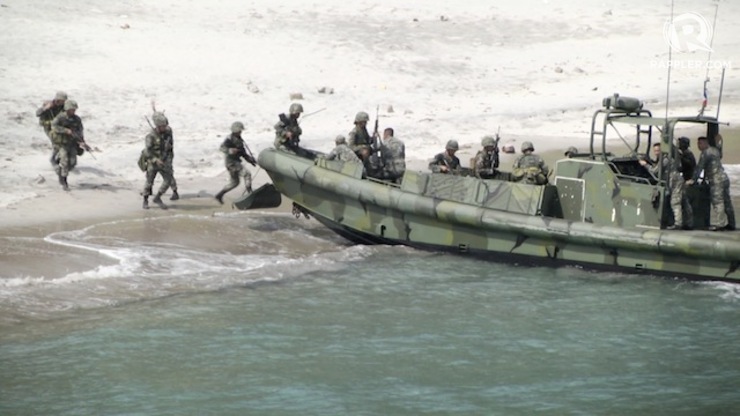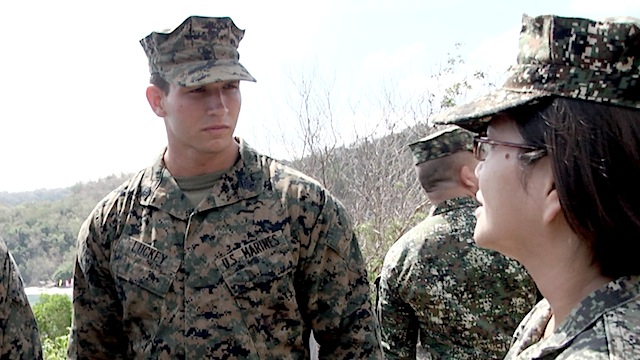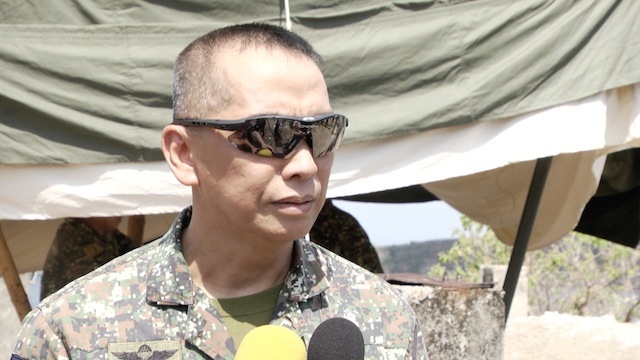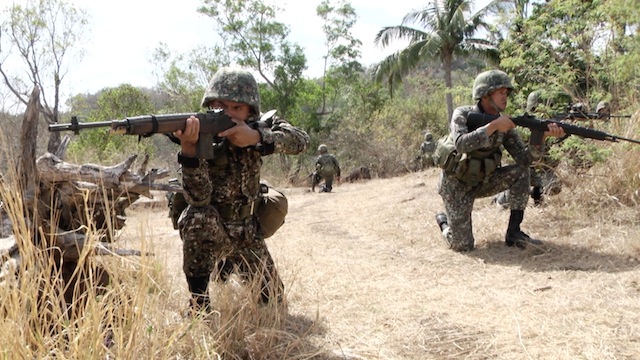From Rappler (May 12): PH-US war games: boat raid, live fire
Aside from interoperability between the Philippines and US troops, the Balikatan war games also improve the capability of Filipino troops
![STEALTH ATTACK: Philippine Marines implement naval exercises with US troops. Rappler photo]()
![Sergeant Matthew Luckey of the US Marines]()
Sergeant Matthew Luckey of the US
![Philippine Marine Corps Training Center Superintendent Colonel Alvin Parreño]()
Philippine Marine Corps Training Center
![]()
Aside from interoperability between the Philippines and US troops, the Balikatan war games also improve the capability of Filipino troops

Two days since the Philippines and US Marines conducted a mock boat raid near the disputed Panatag Shoal (Scarborough ), the Filipinos tried it on their own while the US Marines watched.
The activty for the Balikatan 2014 war games was held just a little farther from the shoal – in a Marine base in Ternate, Cavite
The scenario involved the supposed presence of about 30 enemies camped in one of the coves there. One enemy group camped by the shore and another by the hills above them.
Their mission: launch a stealth attack that will prevent the two enemy groups from reinforcing each other.
Two Small Unit Riverrine Craft (SURC) donated by the US
As the SURC’s M50 caliber machine guns fired at enemies camped in the hills about 800 meters away, snipers started shooting from the hills, and the Marines reached the shoreline and started shooting at the enemies at close range.
As they presumably finished them off, two SURCs returned to extract them from the combat zone.
Successful exercises
“Based on our evaluation, the operation was successful,” said Captain Charlie Domingo of the Marine Corps Training Center.
Domingo explained: “The integration of the Fleet (SURC) and the Marine forces was successful. Both executed the plan and the maneuvers based on the plan of the Fleet and Marine planners.”

US Marines Sergeant Matthew Luckey echoed Domingo's assessment of the war games.
“The exercises are very successful. Fire Suppression was good. They had good security. They were able to take the objective and extract successfully,” he told the media.
For the US Marines, Luckey said the exercises allowed them to see how their boats and the Filipino boats can work together. “It’s good for interoperability of forces and building camaraderie between Philippines
“It’s good to work with the Filipino marines, just to see the similarities we have operating with them and how our training is very similar,” he added.
Balikatan, literally shoulder-to-shoulder, is a regular training exercises between the Filipino and American troops. The newly signed Enhanced Defense Cooperation Agreement (EDCA) further expands the military ties to include new activities such as prepositioning of defense equipment and construction of facilities inside bases.

Colonel Alvin Parreño, superintendent of the Marine Corps Training Center, highlighted the importance of the regular training exercises.
“While the Constitution prohibits them from joining us into a war, the importance of this is the combined operation which might come later on during invasion, war, or rebellion,” said Parreño.
Under the Mutual Defense Treaty, the US and the Philippines
Anti-terror drive, too
Aside from interoperability, Domingo said the exercises also improve the capability of the Filipino troops. (Read about the land exercises in Fort Magsaysay
“It is not all the time that we operate jointly. In this mission, it was mostly our own forces that executed the plan. The Fleet-Marine team was validated in this exercise,” Domingo said.
It was good practice involving the newly acquired riverine crafts that the US
“We are an archipelagic country. Most of the enemies of government as far as Internal Security Operations is concerned are in southern Philippines
